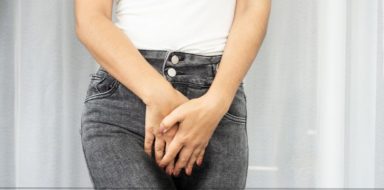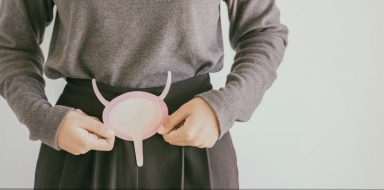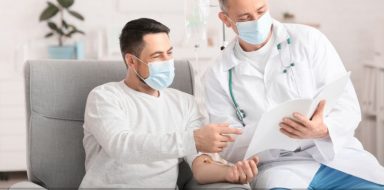Coping With Overactive Bladder at Night
It’s a big problem for many people – the urge to urinate at night. You’re trying to get a good night’s sleep; then you wake up with the intense urge to pee. When it happens night after night, possibly more than once a night, it’s time to talk with your doctor.
You may have overactive bladder, a medical condition that affects an estimated 33 million Americans, according to the Urology Care Foundation.
When you have OAB, you have a sudden urge to urinate that is uncontrollable. You may leak urine when you feel this urge, and might not make it to the bathroom. This leakage is called “incontinence.” When the bathroom trips are multiple during the day and night, you likely have OAB.
If your urine leakage occurs when you sneeze, laugh, cough, or exercise, you have another common bladder problem called stress urinary incontinence (SUI), which is different from OAB.
People with OAB find themselves looking for bathrooms in any new setting, cutting back on water, and being very aware of when they last urinated. All this is to prevent the dreaded “accident.” Unlike urinary tract infection, there is no pain, burning or blood in the urine.
OAB is a frustrating, embarrassing medical problem. The urge to pee at night is especially troubling, as it can result in bed-wetting. But take heart, because this condition is treatable.
Keep reading to learn more about the disorder and steps you can take to prevent this uncontrollable urge to urinate at night.
Why Frequent Urination Happens at Night
Waking up night after night, time after time is vexing and tiring. Why does it happen? It helps to understand the mechanics of the disorder.
Overactive bladder involves the nerves and muscles of the bladder. The urge to urinate is caused by uncontrolled spasms of the bladder muscle. Also, people with OAB have small bladder capacity (<200cc) whereas a bladder normally holds up to 600cc of urine.
Coffee, tea, alcohol, and spicy foods are irritants that can make the problem worse.
If you have OAB, you experience what’s known as urinary urgency, a sudden, uncontrollable desire to urinate. This can occur when the bladder isn’t even full. At times, this urgency makes it challenging to reach a bathroom in time.
When you need to urinate often at night, it’s due to the uncontrollable nature of OAB. The urge to urinate more frequently is a 24/7 problem.
This article will explore arthritis and bladder control, as well as how to control your bowels. Read on to learn more.
How can you know it’s OAB and not another urinary problem? You likely have OAB if you:
- Urinate 8 or more times daily without drinking excess fluid.
- Need to urinate several times every night.
- Urine leakage, bed wetting, and accidents.
Many people with OAB suffer from social anxiety because they fear an accident. They may avoid social situations and change their lifestyles to prevent accidents. However, there’s no escaping the symptoms of OAB even at home at night.
Tips to Control OAB During the Night (and Day)
To help control urinary accidents day and night, a few tips:
- Limit your intake of caffeine and alcohol, which irritate the bladder and increase urine production.
- Ask your doctor about fluid intake - how much is “safe” for you?
- Lose weight to reduce pressure on your bladder.
You can also develop a routine of bathroom trips every two hours or so. Do this even when you don’t feel the urge. You’ll help keep your bladder empty.
Practice pelvic floor exercises can help “train” your bladder. With these exercises, you will learn to tighten your pelvic floor muscles, which will help strengthen and control them.
Another tip: wear absorbent pads at all times. Even thin pads are useful in managing urine leakage and protecting clothes.
Medications to Help Control OAB
Botox isn’t just for wrinkles! Doctors have found that small doses of Botox injections can paralyze bladder muscles. This prevents the contractions that cause urges. The results for using botox for OAB can last about 12 weeks, so you’ll need to repeat treatments. Caution: A potential side effect is the inability to empty the bladder completely.
Several medications can also help relieve overactive bladder. When used along with lifestyle methods, there is a high success rate.
With medications, you can:
- Reduce urinary urgency and frequency
- Increase bladder capacity
- Decrease urge incontinence
- Decrease leaking
Commonly prescribed medications for OAB include anticholinergics, bladder relaxants, target to decrease the bladder muscle overactivity. The medications start to work within one to two weeks, and patients experience the greatest relief within six weeks.
If you suffer from this uncontrollable urge to urinate - especially night-time accidents - you owe it to yourself to talk to your doctor. There’s no shame, as OAB is a very common problem. Change your lifestyle to help prevent and control the problem. And consider medications if your doctor feels it will help.
No one needs to suffer from OAB. You need a good night’s sleep, so take control of the urge to urinate at night.







